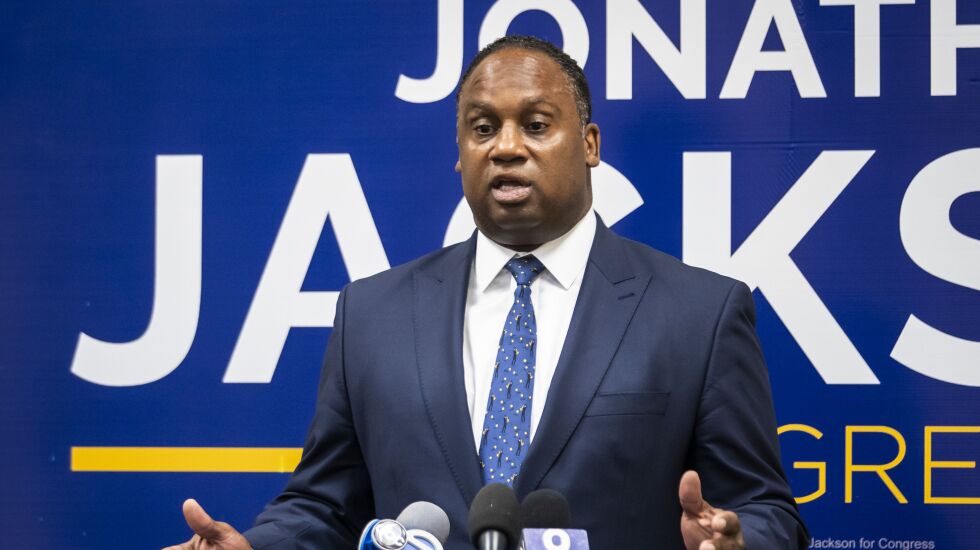
After being blasted by his main rivals for ignoring the law, 1st District House Democratic congressional candidate Jonathan Jackson — whose disclosure finally was made public Thursday, just before the Tuesday election — said he made a “mistake.”
Jackson spoke at a news conference at his campaign headquarters, 8658 S. Cottage Grove Ave., called in the face of two controversies surfacing days before the primary: finally filing — but only under pressure — his statement detailing income, assets and liabilities — and the emergence of more than $1 million in independent expenditure spending by three crypto currency industry PACS to bolster Jackson’s bid.
Asked why he waited so long to file, Jackson said, “I have made a mistake, and its a lesson learned. I did not realize that these documents were so extensive.”
The mandated disclosure about personal finances are different from campaign finance reports filed with the Federal Election Commission.
However, Jackson’s comment didn’t reflect the whole story. He’s known for weeks his disclosure was way overdue.
On June 2, the Chicago Sun-Times revealed that among the top contenders in the primary to replace Rep. Bobby Rush, D-Ill., only Jackson did not file the required document with the House Ethics Committee. On June 2, Jackson told the Sun-Times, “That’s an oversight and a mistake that I did not file.”
Candidates for the House of Representatives are required under the federal Ethics in Government Act of 1978 to file financial disclosures.
The House Ethics Committee, which oversees disclosures, tells candidates, “Individuals are required to file a Financial Disclosure Statement once they raise or spend more than $5,000 in a campaign for election to the House of Representatives.”
As for deadlines, according to the House Ethics Committee instruction guide for the 2022 elections, candidates who raised or spent more than $5,000 must file a financial disclosure report “within 30 days of becoming a candidate” or, in 2022, by May 16. Jackson’s personal financial report posted Thursday and revealed:
- Jackson owns a company, 3I Roadwork, which distributed to him between $15,001 and $50,000 in 2021. The disclosure in this section only required stating a broad range, not a specific number.
- The R.E. Partnerships 1802 E. 71st St. LLC Roseland, described as a building venture, generated between $15,001 and $50,000 in rent. The asset was valued at between $250,001 and $500,000.
- Jackson also listed as assets buildings — no street number was given — on S. Cornell, valued between $500,001 and $1 million; S. Crandon, worth between $100,001 and $250,000 and S. King Drive, pegged at between $250,001 and $500,000. The filing states these buildings did not produce income in 2021; in 2022 to date, they together generated somewhere in the range of between $45,000 and $150,000.
- In 2021, Jackson received $75,000 in “board fees” from 3e LLC, an education consulting company and $63,081 in partnership income from the Roseland Building Venture.
- As for liabilities, as of May, he has between $10,000 and $15,000 in credit card debt. He also has a liquidity access line of credit from Morgan Stanley where the liability was pegged at between $250,001 and $500,000.
More outside spending from the crypto industry to boost Jackson reported to the Federal Election Commission brought the total to $1,041,899 as of Tuesday.
The Chicago Sun-Times broke the news on Sunday that the “Protect Our Future” PAC, bankrolled by crypto billionaire Samuel Bankman-Fried, bought $500,026 in television ads.
There are 17 Democrats in the primary to replace Rep. Bobby Rush, D-Ill., and this torrent of money — for television ads mainly and some direct mail — is coming in the closing days of the June 28 primary.
Jackson’s top rivals — Ald. Pat Dowell (3rd), state Sen. Jacqueline Collins, D-Chicago, and business owner Jonathan Swain — deplored the crypto special interest industry spending aimed at electing Jackson. Jackson was blasted by his rivals for not filing his legally required personal financial disclosure statement detailing his income, assets and liabilities.
And on Tuesday, an FEC filing reveals a new political action committee connected to the crypto currency industry, Web3 Forward, spent $491,250 in media buys to support Jackson.
Contributing: Ashlee Rezin







